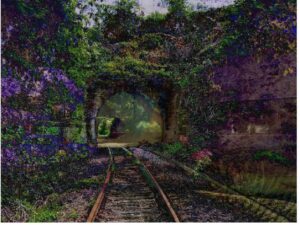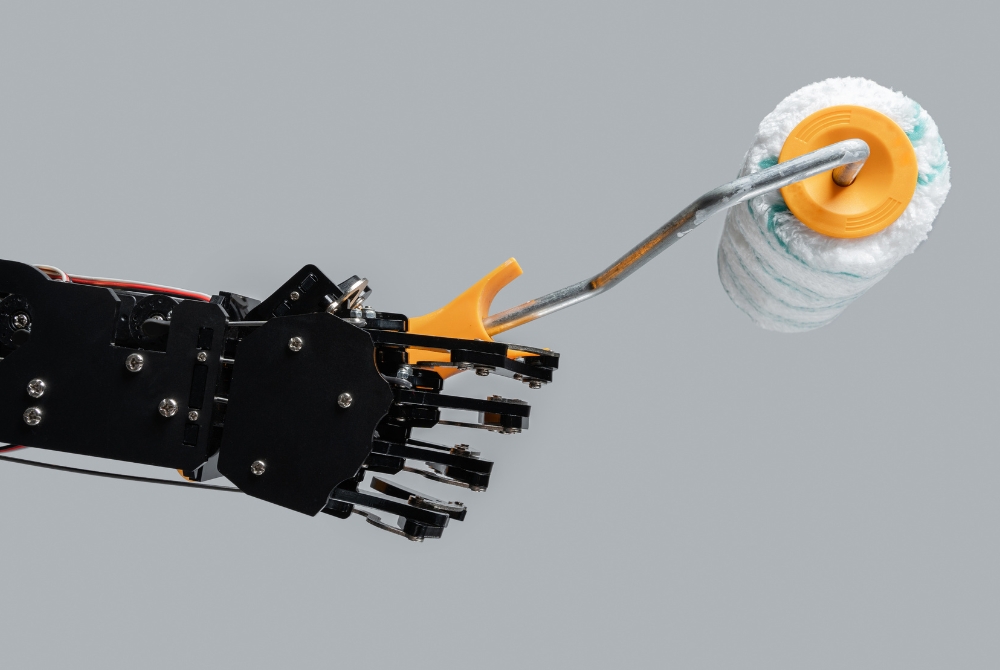AI and copyright are far from new themes in September 2023. You have likely heard about multiple cases on the nature of AI-generated work and how copyright law may (or may not) apply. A recent ruling on a completely AI-fabricated piece of artwork advanced this discussion by tackling a core issue of copyright: human authorship.
The Case in Question: A Recent Entrance to Paradise
The ruling transpired when Stephen Thaler tried to register “A Recent Entrance to Paradise,” a digital painting made by the Creativity Machine, as he dubbed his AI computer system.

We can show the painting without licensing it because it is not copyrighted!
The Copyright Office denied his initial application. He doubled down and contested the denial.
In his initial application, Thaler made the clear point that the AI system created the artwork on its own. He argued that copyright for the computer’s creation should transfer to him in the same fashion that an artist’s work would transfer to an employer in a “work-for-hire” arrangement.
However, unfortunately, his pronouncement of independent AI authorship ultimately doomed his chances at copyright protection. How so?
B.R. (Before Registration)
Amid all the rigamarole of infringement, licensing, and registration dates, creators might forget that copyright does not start with an application to the USPTO. It starts with the creation itself. Registration is a formalization of a copyright that already exists – a necessity in the U.S. if you want to defend your work from infringement.
However, I should add: copyright only springs into existence if the work qualifies. There have been several incarnations of the U.S. Copyright Act and, in all of them, we see standards for what kinds of work can bear a copyright – and what kinds cannot. In the most recent one – the Copyright Act of 1976, the essential phrase is “original works of authorship fixed in any tangible medium of expression, now known or later developed.”
The pivotal word here? Authorship. When Thaler announced that his AI system had created a work without any of his input, this volleyed a question at the court. Who counts as an author? Can you be an author if you are not a human?
While plaintiffs and courts may continue to debate this question as AI develops, the current answer from Judge Beryl A. Howell was a resounding “No.” As she firmly stated in her memorandum opinion:
“Human authorship is a bedrock requirement of copyright.”
Why Does a Human Have to Create the Work for It to Be Copyrighted?
To explain the logic in this case, Thaler v. Shira Perlmutter, Director of the Copyright Office, 1:22-cv-01564 BAH (US District Court District of Columbia, August 18, 2023) Judge Howell went back to the origin of intellectual property. The purpose is to incentivize people to create original and inventive work “and thereby promote science and the useful arts.” This ties creation to commerce, ideally motivating a fizzy, profitable, and public exchange of ideas.
If a fox makes a painting, does it feel the need to display it in a gallery? Does the fox understand what happens if someone buys it? No. The fox does not derive its motivation from commercial ownership (in fact, it seems pretty indifferent) – so it does not need a copyright. In much the same way, the judge reasoned, a computer does not reap benefits from or feel fueled by the proliferation of its intellectual property, so it also does not need a copyright.
Thus, Thaler could not formally register his copyright for the AI-generated artwork, because a copyright never existed in the first place.
Tell the USPTO What You Think of Copyright in AI!
You critical thinkers out there are probably already constructing questions, rebuttals, and hypothetical counters to this ruling. That is understandable. While the judge saw this particular case as rather cut-and-dried because of the lack of human authorship, the Copyright Office recognizes that AI-generated work presents a complex issue.
That is why they have opened an official public discussion period on the legal intellectual property issues surrounding generative AI. The US Copyright Office published on August 30, 2023 a Notice of Inquiry today seeking public input on the copyright legal and policy issues implicated by artificial intelligence, particularly generative AI. They are hoping to receive a broad spectrum of viewpoints and perspectives. Initial comments are due on October 18; reply comments due on November 15. Here is the Federal Register link: Federal Register :: Artificial Intelligence and Copyright
This comment period is a real opportunity to help our IP laws adapt in a practical way with technology and the times.
